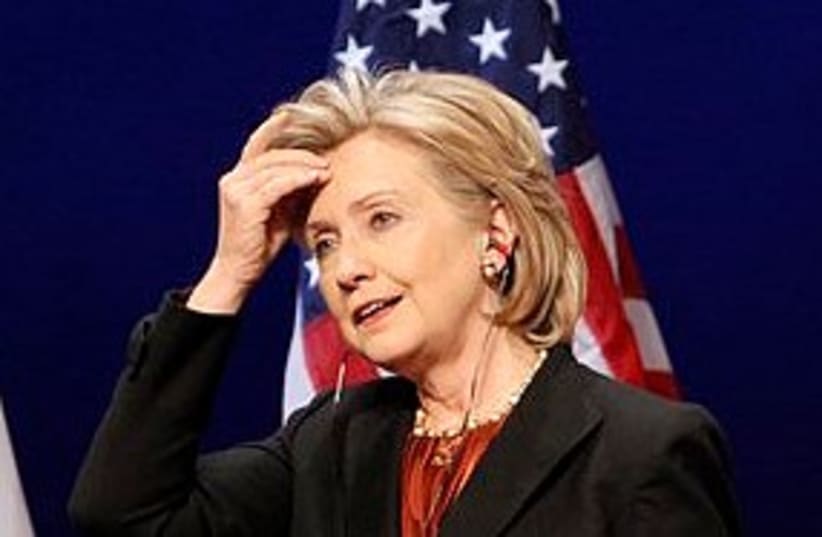Erosion of ties between Turkey and US Jewish groupsWhile Clinton also conveyed her condolences over the flotilla deaths, she did not meet the demands Davutoglu laid out ahead of their meeting.“I have to be frank: I am not very happy with this statement from Washington yesterday,” Davutoglu said before his more than two-hour meeting with Clinton. “We expect a clear condemnation.”He also complained that America had watered down a UN Security Council resolution so that it didn’t condemn Israel.Also Tuesday, Erdogan, during a session of parliament, called the raid a “bloody massacre” and declared that “nothing will be the same again” in the Turkey-Israel relationship.“The Americans are involved and they’re trying to keep things as stable as possible and prevent deterioration,” said an American Jewish leader who tracks Turkey and US Middle East policy on the Israel-Turkey relationship and who spoke on condition of anonymity. “They’re trying to keep things contained.”While in the past American Jewish organizations were seen as a crucial bridge to Turkey, maintaining close ties with the embassy and often collaborating on Washington issues, those ties have been eroding in recent months. The latest incident is only the most dramatic and raw wound in a steady deterioration in relations.“There’s a growing frustration and disappointment with how Turkey hasconducted its relations with Israel, which seems to continue toaggressively push Israel and not try to work with it,” the Jewishleader said, noting his organization had not been in touch with Turkishofficials.However, Jason Isaacson, director of the American Jewish Committee’sWashington office, said that his organization had been reaching out tothe Turks.“We have established contacts with many people in the Turkishestablishment and we are communicating a message of great concern andsupport for the fundamentals of the relationship,” he said. “We hopethose messages are being conveyed.”As a sign of the American stabilization effort, the anonymous Jewishleader pointed to US efforts to keep the Security Council resolutionfor faulting Israel.Israel's position in American foreign policyAmidst harsh rhetoric from Turkey, he said the Obama administration wastrying hard to calm the tone and “be supportive of Israel even if it’snot what Israel wants.”He acknowledged, though, that some see this as a sign of US and Israeliinterests not aligning and Israel being a strategic liability forAmerica.Even Mossad chief Meir Dagan told the Knesset Foreign Affairs andDefense Committee on Tuesday that strategic ties between Jerusalem andWashington have been slowly changing since the conclusion of the ColdWar.“Bit by bit, Israel is becoming less of a strategic asset for America,” Dagan said in his meeting with committee.Still, White House spokesman Robert Gibbs strongly rejected any fraying of ties.Asked if Israel had become a political burden to the US, he responded:“No. Let me be clear here. The United States and Israel – as I havesaid on countless occasions, we have a trusted relationship. They arean important ally and we are greatly supportive of their security.That’s not going to change.”
US gov't, Jews try to shore up Turkey-Israel ties
Clinton meets with Turkish FM to listen to concerns.

Erosion of ties between Turkey and US Jewish groupsWhile Clinton also conveyed her condolences over the flotilla deaths, she did not meet the demands Davutoglu laid out ahead of their meeting.“I have to be frank: I am not very happy with this statement from Washington yesterday,” Davutoglu said before his more than two-hour meeting with Clinton. “We expect a clear condemnation.”He also complained that America had watered down a UN Security Council resolution so that it didn’t condemn Israel.Also Tuesday, Erdogan, during a session of parliament, called the raid a “bloody massacre” and declared that “nothing will be the same again” in the Turkey-Israel relationship.“The Americans are involved and they’re trying to keep things as stable as possible and prevent deterioration,” said an American Jewish leader who tracks Turkey and US Middle East policy on the Israel-Turkey relationship and who spoke on condition of anonymity. “They’re trying to keep things contained.”While in the past American Jewish organizations were seen as a crucial bridge to Turkey, maintaining close ties with the embassy and often collaborating on Washington issues, those ties have been eroding in recent months. The latest incident is only the most dramatic and raw wound in a steady deterioration in relations.“There’s a growing frustration and disappointment with how Turkey hasconducted its relations with Israel, which seems to continue toaggressively push Israel and not try to work with it,” the Jewishleader said, noting his organization had not been in touch with Turkishofficials.However, Jason Isaacson, director of the American Jewish Committee’sWashington office, said that his organization had been reaching out tothe Turks.“We have established contacts with many people in the Turkishestablishment and we are communicating a message of great concern andsupport for the fundamentals of the relationship,” he said. “We hopethose messages are being conveyed.”As a sign of the American stabilization effort, the anonymous Jewishleader pointed to US efforts to keep the Security Council resolutionfor faulting Israel.Israel's position in American foreign policyAmidst harsh rhetoric from Turkey, he said the Obama administration wastrying hard to calm the tone and “be supportive of Israel even if it’snot what Israel wants.”He acknowledged, though, that some see this as a sign of US and Israeliinterests not aligning and Israel being a strategic liability forAmerica.Even Mossad chief Meir Dagan told the Knesset Foreign Affairs andDefense Committee on Tuesday that strategic ties between Jerusalem andWashington have been slowly changing since the conclusion of the ColdWar.“Bit by bit, Israel is becoming less of a strategic asset for America,” Dagan said in his meeting with committee.Still, White House spokesman Robert Gibbs strongly rejected any fraying of ties.Asked if Israel had become a political burden to the US, he responded:“No. Let me be clear here. The United States and Israel – as I havesaid on countless occasions, we have a trusted relationship. They arean important ally and we are greatly supportive of their security.That’s not going to change.”